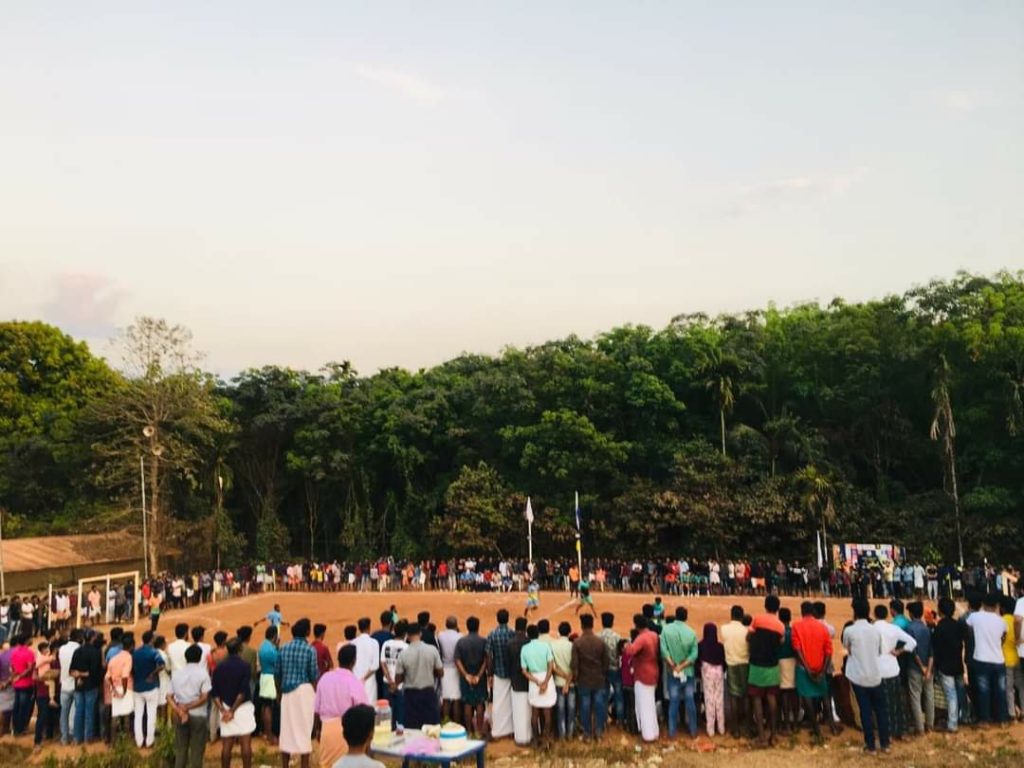Stopped at the halftime whistle: Malabar’s Sevens football hit by the Pandemic
Sevens football is the soul of Malabar’s football heritage. Once the monsoon is over and the fields are dry, the fans are ready for the festive nights of a fresh sevens season. The towns from Thrissur to Kasaragod swivel their night to day, in the glow of floodlights. From Olympian Rahman to IM Vijayan, from Muhammad Rafi to Anas Edathodika, Malabar’s ever renowned boots have sprinted through the rough and tuff fields of sevens. Every new season begins with the sound echoing in your streets in the loudspeaker tied on the top of slowly moving jeeps and recently with the audio clips forwarded from groups to groups through the social media. These audio clips which introduce the teams and their players with music in the background pull the fans to temporary galleries built using palm woods. The cultural figures like Ezhuthachan and Moyin Kutty Vaidyar, the eulogies of Malabar rebellion and its martyrs, lyrics of Mappila songs, the fear of Africa’s dense forests and elephants, the heat of Sahara Desert and the lions of Liberia are some of the metaphors used in these audio messages. Like it is said in those audios “The black hunter, the Sixth King, six feet, the real Man! The Liberian Lion Adebayor”, “The goal thirsty black panther, King of all the kings with the sword at his legs, Ghana’s Kingsley” “From the lands fought ethnic conflicts and wars, with the same blood and Power, Liberia’s Francis and Junior Francis” etc. Are the players whom the spectators are eager to see on the pitch. The Africans rule mud and minds of football lovers here.
Malabar’s seven a side football is played with slightly different sets of rules from the professional Elevens game and its history dates back to late 1950s, with ‘Khader Ali All India Sevens League’ being one of the oldest. In its early years, the managers and football enthusiasts belonging to different parts of Northern Kerala had to gather at the Muthalakkulam Maidanam ground at the centre of Kozhikode city. Though the most of the tournaments are held at Malappuram and Thrissur, the official bidding, player supply and scheduling the concurrent season happened for decades in the heart of Calicut until the formation of Sevens Football Association (SFA) in 1996.
Annan Nagaraj was a merchant from Madurai who used to sell Aluminum vessels near to Muthalakkulam Maidanam. Breathing the footballing air for a few decades, he set up a football team called Bluemax Madras and played football tournaments at various parts of Tamil Nadu with the help of players and managers from Kozhikode.

In 1988, he returned from his business trip to Kolkata with two Nigerian footballers, marking the beginning of foreign players’ recruitment in sevens football. Since then for decades now, the African footballers championed the fields of Malabar. The foreign players who failed the selection trials for the major clubs in Kolkata and Bombay were brought to Kerala by Nagaraj. At the time when there were no Visa restrictions, the managers ran to Nagaraj who resided in the Rainbow hotel behind Kozhikode railway station; to pick their ‘African card’. For years, Nagaraj sat in the rainbow hotel and decided the squads for different teams in Malabar. Once the foreign Registration act came into existence, all the players had to be registered at Foreigner Registration Offices on the personal guarantee of corresponding managers, thus bringing changes in the selection of foreign players.
The selection methods changed as the new visa rules impose travel restrictions on players. The squads once dominated by Nigerian footballers are taken over by Liberians and Ivorians, where the visa validation and related processes were comparatively easier. Nowadays the selection is primarily based on the information provided by current players and those videos watched on YouTube. Though it takes a few weeks for a foreign player to adapt to the highly physical and slightly different position-oriented style and structure of this format, a good player can hold a weighing money bag when he returns home.
The Covid-19 Pandemic and the Lockdown of African Footballers
As the novel coronavirus continued its spread, the world returned to their homes. The mandatory quarantines and lockdowns led to the temporary or permanent stoppage of different football leagues globally. During this period, Messi’s work out lessons to little Mateo, Fabregas’ ‘fuck you too’ echoing in the neighborhood, Peter Cech’s ”goalkeeper challenge” dribbling balls in hands, Memphis Depay’s ‘hang out with little lion, Jesse Lingard’s crossbar challenge at his home yards, all went viral on social media. But for the smaller leagues, its teams and players seem to have different stories to share. It is an obvious fact that the lower tier and local football cultures across the globe are going to be adversely impacted when the premier clubs in Europe has got its stake of crisis.

PM’s declaration of All India lockdown on March 25th blown the final whistle for the 2019-2020 sevens season in Kerala. Most of the major tournaments stopped. Thrissur district could host only one of their ten tournaments and Malappuram had only eight out of twenty-four. Kannur and Kasaragod could finish only one tournament. Though Calicut completed their three out of four tournaments including ‘Koyappa All India Sevens, Koduvally’, which is the largest cup of all, Wayanad district had to call off their only tournament in the middle. In those days when India witnessed the labourers walking home from far states and many falling on their way, the African footballers travelled the continents to Malabar for their monetary means; got trapped in Kerala.
Juan Muller, a twenty-three-year-old Ghanaian footballer played in sevens league for ORPC Kecheri had to spend days in the gardens and parking lots of Mumbai airport eating bread until he was found by Mumbai District Football Association President Aditya Thackeray. Muller was in a hurry to reach home when he heard the news of an upcoming international travel ban.
When we enter into the sixth month of the first lockdown declaration, almost two hundred players from different parts of Africa are pushing their days in Kerala without even proper food and accommodations. The expected flood days in Kerala might be adding more troubles to the lives of the ‘black panthers’ if there are no immediate measures from the side of governments.

In the normal circumstances, the African players join the teams in December and return home by June after a six-month season. A good player will play an average of 160 games in the period of 180 days, reaching a peak of playing hours during the summer vacations in May. When the football was banned as a precautionary measure by the end of March, the players couldn’t even complete half of the expected number of matches. This has deterred the income for the players as they are paid according to the matches they play. The days they spent in rented flats with games, movies, prayers, cooking and altered lifestyle cannot be managed any more. The players are desperate to reach home by any means.
“We are just managing to live without proper food. We are eating rice every day; lifestyle has completely distorted. You can think how it is going to affect our fitness as footballers” says Liberian forward James, popularly known as Adebayor. Adebayor is one of the most popular players of the tournament, famous for his goals combined with former Gokulam Kerala’s forward Ashiq Usman; in Royal Travels Kozhikode.
The sevens football managers are not rich as it is seen from outside. The managers remain in the arena because of the passion and love towards the game and the fame they can acquire through it. Sevens tournaments are the only economic resource for many of the managers. The management had to be run on loans and debts in the previous months even for the daily expenses of foreign players as most of the tournaments had to call off.
“Sevens is not a business where you can make a profit, rather it takes money. It’s like to say ‘My grandfather had an elephant’, If you have it, you will have to take care of it. That’s how you will be known to people. Now I have already spent six lakh Rupees for the last six months on my foreign players. I have only six players with me, there are managers with more players. I will have to spend more soon. The only thing I look forward is to send them home” says Sahrafudheen, manager of Asian Youth Club, Ucharakkadav. His team is having six players from Africa, two each from Liberia, Ivory Coast and Ghana.
“In the beginning, we were receiving sponsorships to run the daily expense for the players. Now it’s running on loans. Rents and daily expenses have turned unbearable for us” says Vinod, the manager of Fitwell Kozhikode.
Many players denied the offers by some of the rich managers to fly them aboard, as they will have to leave their co-players back here in Kerala.

“Some wealthy managers are glad to offer big amounts to some of the players to get back home. But that will leave many of our brothers behind who have not earned much from here. So we are staying united. All two hundred players should go together. We have to be home” Adebayor added.
“This is my first visit to Kerala; it is a good place with good people. I want to come back here, but now I have to reach my home. There are my friends who eat one time a day. Yesterday my friends called and said that their residence area is being flooded. We could manage if it is our motherland. But in a different place, you don’t know what to do ” said Richmond, the newly signed central forward of Fitwell club. The Ghanaian was part of the protest video which was sent to Ghana embassy by all players from Ghana. He says the government didn’t even notice their protest.
After continuous representations and requests to the central government and the embassies of different African countries went unattended, now the managers are moving for crowdfunding. The project named as ‘Kerala to Africa’ headed by Vinod and Abdul Jabbar, managing staff of Royal Travels, Kozhikode; is appealing the public for contributions in order to chart flights to Abidjan. Abidjan, the major urban city of Ivory Coast is a door to west Africa where most of the players hail from. The players belong to Ivory Coast, Ghana, Liberia, Liberia, Sierra Leon, Uganda, Burkina Faso, Guinea and Mali.
The Indian national footballers like IM Vijayan, Muhammad Rafi, Anas Edathodika and Sahal Abdul Samad have shared their videos appealing for donations, though it costs almost one lakh rupees per individual to get in chartered flights.
In April, FIFA announced immediate financial support of $150m to all it’s 211 member nations. It’s unpredictable how much of the amount will be trickling down in Indian Football. Moreover, Local or amateur football always thrive outside the hands of FIFA or professional football realms. But, from the top of high hills of Northeast India to coasts of Malabar, that’s where the football is best lived, and loved. Challenges brought on by the COVID-19 pandemic will also leave the sevens football in troubles for the foreseeable future.
The lockdown and the travel ban longer than the anticipated period is pushing these African footballers to more miserable conditions. The life of almost 200 African players, in the local ‘sevens language’, of black Panthers, of African elephants, or of Liberian lions, or of the people who hide swords in their boots are now hung under the sword of uncertainty. Home is everything, either in a match or in life. Like Adebayor said, “Africa is our home, drop us somewhere around, we can move there freely”.
At their homes, everyone is strong, they can forget the past sorrows, downfalls and can come back from far behind, like Barcelona’s La Remontada, or Liverpool’s quick corner at Anfield.
But there should be a home fixture!


